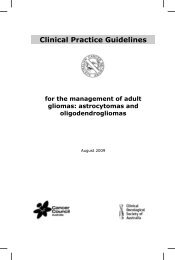Clinical Practice Guidelines for the management of locally advanced ...
Clinical Practice Guidelines for the management of locally advanced ...
Clinical Practice Guidelines for the management of locally advanced ...
You also want an ePaper? Increase the reach of your titles
YUMPU automatically turns print PDFs into web optimized ePapers that Google loves.
Microscopic fully resected node positive disease<br />
There was a single RCT examining <strong>the</strong> effects <strong>of</strong> long-term adjuvant castration <strong>the</strong>rapy <strong>for</strong> patients<br />
with microscopic fully resected node-positive disease. 18 Un<strong>for</strong>tunately it was <strong>of</strong> medium quality as it<br />
was not blinded and it was closed early due to poor accrual. It <strong>the</strong>re<strong>for</strong>e had small numbers and low<br />
power. There was a hazard ratio <strong>for</strong> survival <strong>of</strong> 3.0 with a median follow-up <strong>of</strong> 7.1 years 18 and 2.14<br />
with longer follow-up (median follow-up <strong>of</strong> 11.9 years, which was published in June 2006) 101<br />
favouring <strong>the</strong> long-term ADT arm. The notion <strong>of</strong> systemic <strong>the</strong>rapy being beneficial is possibly<br />
consistent with <strong>the</strong> benefit seen in patients with high-risk disease treated with ADT and radio<strong>the</strong>rapy<br />
versus radio<strong>the</strong>rapy alone. The clinical impact <strong>of</strong> this data set is limited to patients with lymph node<br />
positive disease that has been resected. Only patients with pathological node-positive prostate cancer<br />
to undergo a lymph node dissection, which fur<strong>the</strong>r supports per<strong>for</strong>ming <strong>the</strong> procedure in patients with<br />
high-risk prostate cancer.<br />
It should be highlighted that <strong>the</strong> toxicity <strong>for</strong> patients on androgen deprivation is significant, with<br />
unwanted effects in terms <strong>of</strong> cardiovascular, genitourinary (impotency) systems as well as weight gain<br />
and gynaecomastia causing significant problems <strong>for</strong> a minority <strong>of</strong> patients (see Complications and<br />
cumulative treatment toxicity under section 3.1.1). The problem <strong>of</strong> hot flushes was rated as highly<br />
significant, affecting 59%. 18 It should be noted that since this publication, a greater awareness <strong>of</strong> o<strong>the</strong>r<br />
untoward effects <strong>of</strong> ADT (such as bone substance loss and its consequences, <strong>the</strong> metabolic syndrome<br />
and cognitive problems) has occurred.<br />
The translation <strong>of</strong> <strong>the</strong>se data into practice is limited to patients with fully resected lymph node<br />
positive disease. It must <strong>the</strong>re<strong>for</strong>e be emphasised that a lymph node dissection be undertaken. The use<br />
<strong>of</strong> ADT as adjuvant <strong>the</strong>rapy <strong>for</strong> in<strong>for</strong>med patients with lymph node positive disease in <strong>the</strong> Australian<br />
medical system is applicable, as <strong>the</strong> PBS requires patients to have ‘<strong>locally</strong> <strong>advanced</strong> (equivalent to<br />
stage C) disease’ (PBS wording).<br />
Evidence summary Level References<br />
Nei<strong>the</strong>r <strong>of</strong> two RCTs <strong>for</strong> <strong>locally</strong> <strong>advanced</strong> disease (pT3–4No/Nx),<br />
nei<strong>the</strong>r <strong>of</strong> which showed a survival benefit <strong>for</strong> post-operative longterm<br />
anti-androgen <strong>the</strong>rapy.<br />
The effects <strong>of</strong> castration <strong>the</strong>rapy as an adjuvant to prostatectomy<br />
have not been reported in an RCT.<br />
For fully resected node-positive disease <strong>the</strong>re is evidence <strong>of</strong> overall<br />
survival advantage in one study that was closed early.<br />
Recommendations<br />
II 6, 23<br />
II 18<br />
For <strong>locally</strong> <strong>advanced</strong> prostate cancer, anti-androgens as an adjuvant mono<strong>the</strong>rapy to<br />
radical prostatectomy are not recommended.<br />
Grade B<br />
35<br />
Locally <strong>advanced</strong> disease



